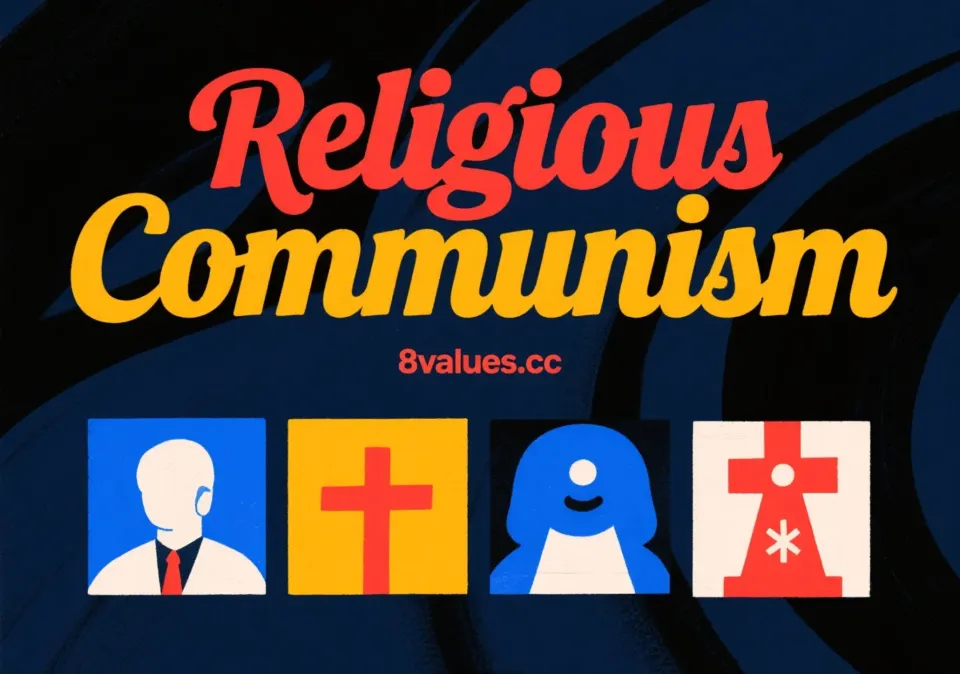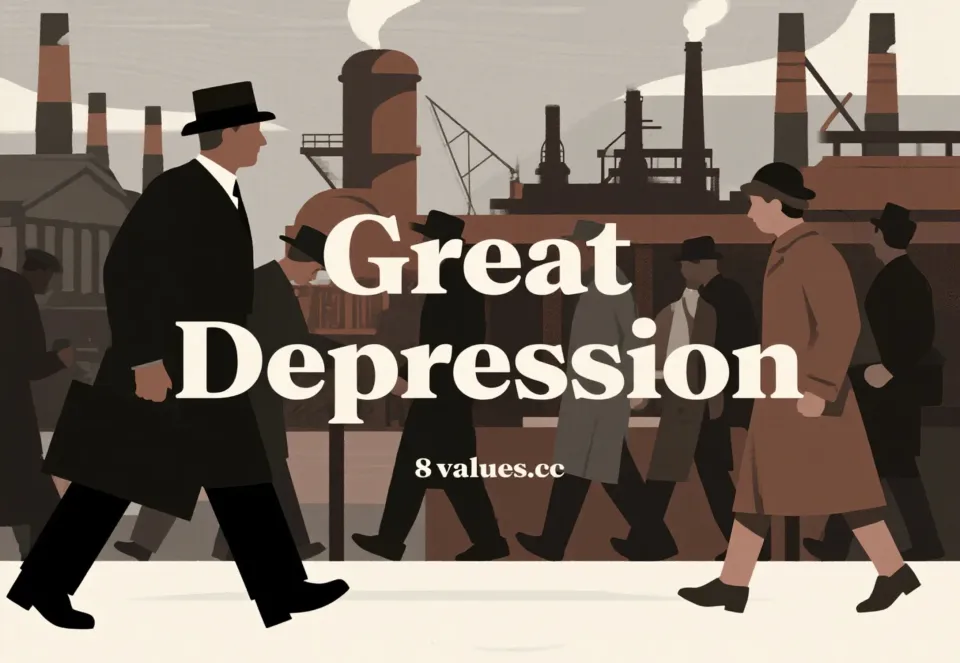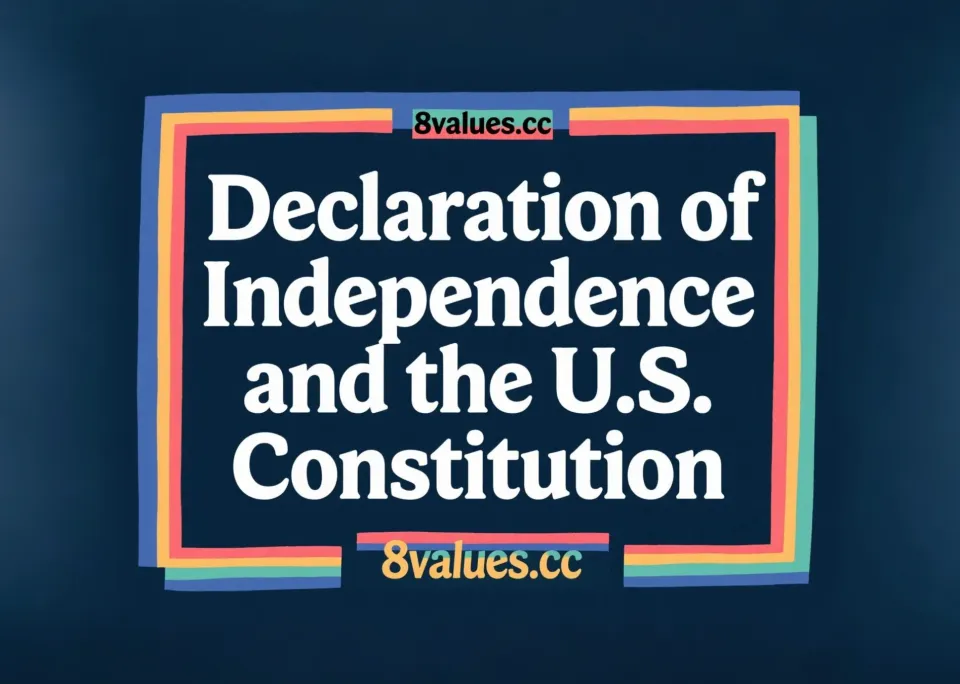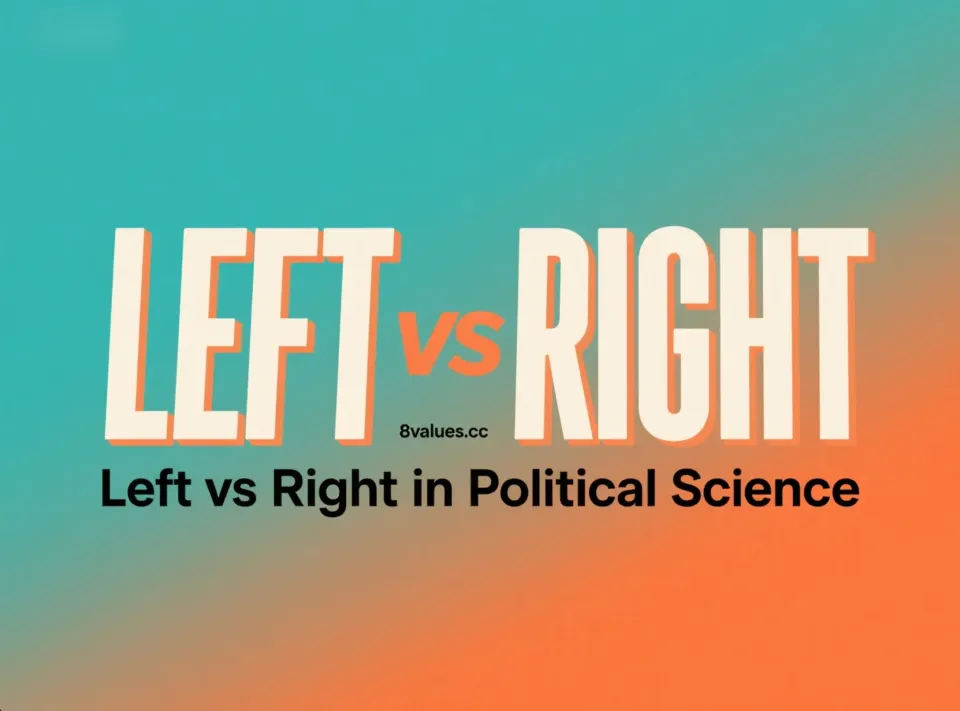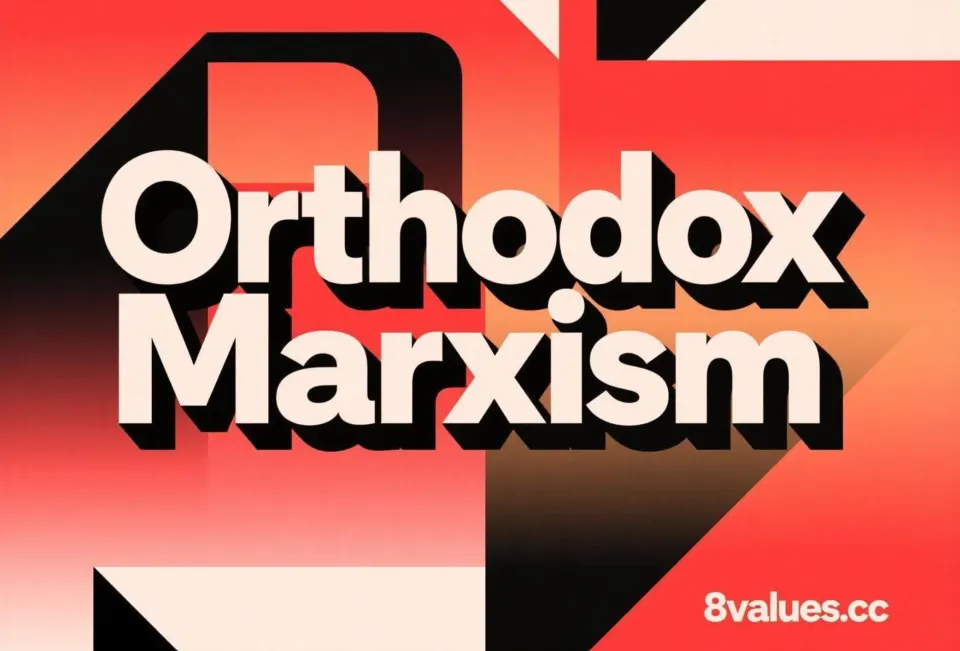Religious Communism | 8values Interpretation of ideological ideology in political tests
Explore the unique political idea of Religious Communism in depth and understand how it integrates deep religious beliefs with the principle of shared ownership of property. This article will cover the historical roots of religious communism, manifestations in different religious contexts, complex relationships with Marxism, and its far-reaching impact on social change. By understanding this ideology, you will have a more comprehensive understanding of the interweaving of beliefs and social ideals.
In the complex political ideology spectrum, "Religious Communism" is a thought-provoking concept. It challenges many people’s inherent perceptions that communism is purely secular or atheistic movement, showing the profound role of faith in the pursuit of social equality and material sharing. If you find yourself leaning towards this result after performing the 8values political tendency test , understanding its deep meaning will help you better understand this political idea. Religious communism is not just a theory, it is also a long-standing practice rooted in the pursuit of justice, equality and collective welfare by various religious traditions.
The definition and core characteristics of Religious Communism
Religious communism is a political philosophy that combines religious principles with communist ideology, and its core feature is the emphasis on the sharing and sharing of property. Scholars use this term to describe various social or religious movements in history that support common ownership of property. TM Browning defines religious communism as a form of communism that “directly originates from the inherent principles of religion.” Hans J. Hillerbrand described it as a religious movement to “advocate the common ownership of property and the consequent abolition of private property.”
Similarities and similarities with secular communism Religious communism and traditional secular communism, especially Marxism, have significant differences, but they also share some political goals. Hillebrand pointed out that Marxism is an ideology that calls for the elimination of religion, which is in contrast to religious communism. However, Donald Drew Egbert and Stow Persons argue that religious communism often predates secular communism in chronological terms.
Religious communism opposes pure materialist communism (such as Marxism), and believes that spiritual beliefs can provide moral impetus for social change. It takes the doctrines and values of a particular religion, such as Christian love and justice, Islamic help to the poor, or Buddhist compassion and non-attachment as the theoretical basis for supporting common ownership and collective interests.
Christian Communism: Historical roots and biblical basis
Christian communism is one of the most well-known forms of religious communism, and it is a theological view that the teachings of Jesus Christ require Christians to support communism as an ideal social system. Many Christian communists believe that biblical evidence shows that early Christians, including the apostles, established their own small communist society in the years after Jesus’ death and resurrection.
The sharing practice of early Christianity The cornerstone of this concept is the concept of " koinonia ", which means a shared or shared life and is realized through voluntary sharing of goods and services. Acts record the common property model of early Jerusalem Christians: "The believers gathered together, and all things were used for public use; they also sold land, property and property, and distributed to each person as they needed." Acts also records: "No one in the world is lacking, because everyone sold all the land and houses, took the price of silver sold, placed it at the feet of the apostle, and distributed it to each person as needed." These practices helped early Christians survive after being besieged by Jerusalem and were taken seriously for centuries.
Jesus’ own teachings are also seen as evidence of anti-capitalism and support for sharing. For example, in Luke, Jesus asked his disciples to sell their belongings to help the poor. Matthew points out that "a man cannot serve two Lords; either he hates this and loves that, or he values this and downsides that. You cannot serve God and serve wealth and profit." In 1 Timothy, “Greed in money is the root of all evil.” These verses are interpreted by Christian communists as Christian faith is essentially contrary to the capitalist concept of "loving money".
Evolution and radical movement in history From the height of the Middle Ages in Europe, various groups supported Christian communism and rural communist ideas. For example, both the Waldensians in the 12th century and the Apostolic Brethren in the 14th century both practiced property ownership. In the 16th century, Thomas More portrayed a society based on the common ownership of property and managed by reason in his book Utopia.
During the Reformation period, the Anabaptist communist movement led by Thomas Müntzer played an important role in the 16th-century German Peasant War and was analyzed by Friedrich Engels in the German Peasant War. During the British Civil War, the Diggers led by Gerrard Winstanley also clearly advocated the concept of communism and land sharing. These historical movements, both success and failure, reflect an attempt to combine Christian faith with a vision of social equality.
Modern Christian Communism and Liberation Theology In the second half of the 20th century, Liberation Theology in Latin America became a typical representative of Christian communism. Liberation Theology combines Christian theology with socio-economic analysis, emphasizing social concern for the poor and political liberation of oppressed people. It believes that "God stands on the side of the oppressed, and faith is always the driving force of resistance, not contradiction." Ernesto Cardenal, pastor and Minister of Culture of Sandino National Liberation Front in Nicaragua, once said: "Christ leads me toward Marx... To me, all four gospels are equally communist. I am a Marxist who believes in God, following Christ and revolutionizing for his kingdom." Theologians such as Gustavo Gutiérrez and Leonardo Boff were their main advocates.
Even some senior members of the Catholic Church expressed some resonance with communist thought. Pope Francis has said that if anything, “a communist is more like a Christian” because Christ talks about a society where the poor, the weak and marginalized groups have the right to make decisions. Although he does not consider himself a communist, he recognizes that Christians, Marxists, socialists and communists share a common mission.
Communist thoughts in other religious contexts
Religious communism is not unique to Christianity, and similar ideas of shared property and collectivism exist in other religious traditions.
Islamic communism/socialism Historically, some Islamic communities have also shown the qualities of communism. For example, the society established by the Qarmatians in Bahrain oasis was described as having a communist nature in the 9th and 10th centuries. Mikhail Skachko, the Bolshevik, said at the Oriental National Congress: "Muslim religion is rooted in the principle of religious communism, that is, no one can become a slave to another person, and no piece of land can be owned privately."
Islamic Marxism attempts to apply the economic, political and social teachings of Marxism within the Islamic framework. Since the 1940s, the fit between Marxism and the Islamic ideal of social justice has prompted some Muslims to accept the form of Marxism. Islamic Marxists believe that Islam can meet social needs and can adapt to or guide the social changes that Marxism hopes to achieve. For example, Sukarno, Indonesia, once integrated socialism, Marxism and Islamic thought.
Core teachings such as karuna and anatta in Buddhist Buddhism are also used by some to promote social equity and collective well-being. The Dalai Lama once publicly stated that he was a Marxist. He believes that "the complementarity of Marxism and Buddhism." Soto Zen is also considered highly compatible with communism.
The complex relationship between religious communism and Marxism
The relationship between religious communism and Marxism is complex and multidimensional, with both common social goals and profound philosophical differences.
Marx's view on religion Karl Marx's famous saying "religion is the opium of the people" is often misunderstood as a simple negation of religion. However, in the complete context, Marx describes religion as "the sigh of oppressed creatures, the feelings of the ruthless world, the soul in a soulless state." He believes that religion is a way for people to seek comfort in pain, a survival mechanism that maintains human nature in a cruel world, not a manifestation of weakness. For Marx, capitalism is the enemy, not religion itself. He believes that faith exists in the material world and responds to material conditions.
Compatibility and conflict Despite these historic repressions, many believers and scholars believe that religion is not completely incompatible with communism. Some Christian communists accept Marxist economic theories (such as surplus value) but reject their atheistic premise. They believe that faith can inspire people to fight for social justice and solidarity, and these goals are also consistent with the core values of communism. Some Marxists, such as Louis Althusser, even became communists because of their Catholic background, believed that communism was a more effective way to achieve "universal fraternity."
However, Nikolai Bukharin and Evgenii Preobrazhensky made it clear in his Communism ABC that religion and communism are incompatible in theory and practice. They believe that the church, as a religious propaganda organization, aims to safeguard the ignorance and religious slavery of the masses and to form alliances with the state to oppress workers.
Important figures and the role of representative movements in religious communism
In the long history of religious communism, many thinkers, leaders and practitioners have emerged, and their contributions have jointly shaped the diverse face of this ideology.
Key thinkers and practitioners:
- Mazdak : Ancient Persian Reformer who advocated primitive socialist ideas and a more equal society, whose doctrine was regarded as early "communism".
- Thomas More : A 16th-century British writer whose Utopia depicts a rationally managed society based on shared property, regarded as an early example of Christian communism.
- Thomas Müntzer : A radical leader of the 16th-century German peasant war, advocated the establishment of a "millennium kingdom" through violence, and was regarded as a practitioner of early religious communism.
- James Connolly : A leader of the Irish workers' movement and a Marxist thinker, and a devout Catholic, advocates that religion should be a private matter and does not interfere with the communist plan.
- Ernesto Cardenal : Pastor and Minister of Culture of the National Liberation Front in Sandino, Nicaragua, an important advocate of liberation theology, he combined Christian faith with Marxist revolutionary thought.
- Gustavo Gutiérrez : known as the father of liberation theology, emphasizes social justice and the "priority" for the poor, and deals with poverty and oppression in Latin America through theology.
- Fidel Castro : The Cuban revolutionary leader believed that the goals of Christians and communists were "great coincidences" and both pursued social welfare and people's happiness.
Representative organizations and communities:
- Shakers : Protestant communes in the 18th century in the United States, implementing a strict system of shared property and collective life, and their religious communism was described as a community where "all belongs to each other."
- Oneida Community : A religious commune in New York, USA in the 19th century, all property was shared except a few personal belongings.
- Liberation Theology Movement : The Catholic left-wing movement that emerged mainly in Latin America in the 20th century, combining Christian doctrine with Marxist social analysis, focusing on the liberation and anti-oppression of the poor. The movement provided theological basis for the land reform and labor rights movement in Latin America.
- Bruderhof and Hutterites : Existing Christian groups adhere to strict compliance with biblical principles and church discipline, and implement a form of communism, namely, implementing a system of shared property within the community.
These characters and movements show that religious communism appears in various forms in different historical periods, geographical and religious contexts, and its ideas and practices enrich human exploration of social equality and collective well-being.
Conclusion: Multiple interpretations and future of religious communism
Religious communism is a complex and multi-level ideology that transcends the boundaries between secular and divine, closely combining the belief in transcendence with the pursuit of human fairness and justice. From the “common use of all things” of early Christian communities to the liberation theology of Latin America, to similar thoughts in the context of Islam and Buddhism, it demonstrates the strong potential of faith in promoting social change.
Although traditional Marxism is critical of religion and many communist regimes have severely suppressed religion, practitioners of religious communism have proved that faith can be parallel to the social goals of communism. In fact, for many, their beliefs are the driving force behind their commitment to a more just and equal social movement.
By understanding religious communism, we are able to recognize how diverse and hierarchical the formation process of ideology is. It reminds us that human pursuit of an ideal society can have different theoretical paths and practical forms. If you are curious about your political tendencies, try 8values political ideological tendency self-testing , explore your ideological political coordinates in depth, and check out the detailed introduction of all 8values results ideology . In addition, you can find more articles on political theory and its real-life applications in our blog .
